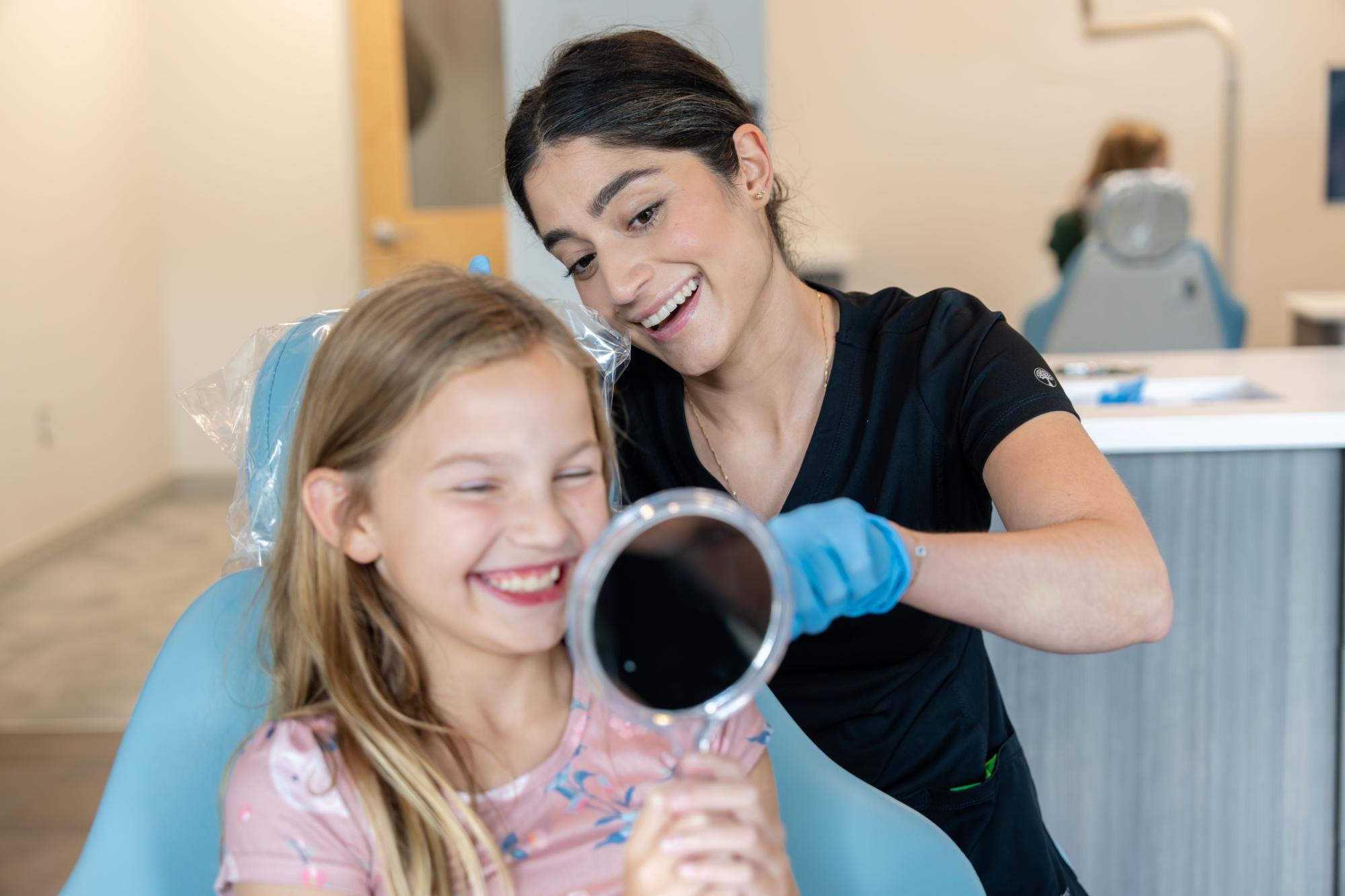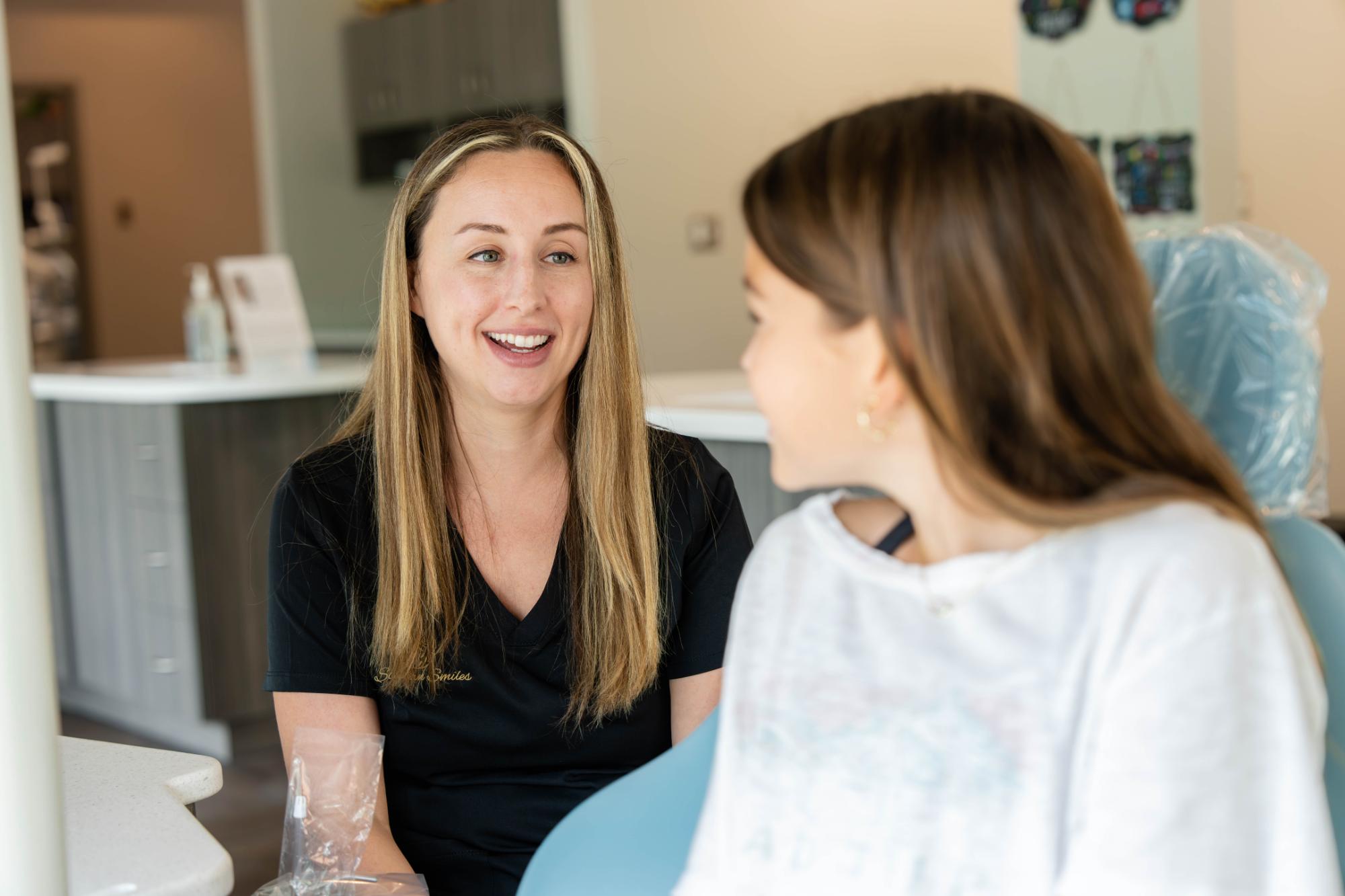When Should My Child
First Visit the Dentist?
If your infant has any oral or dental condition that bothers you or appears to be out of the ordinary, then your child should be seen regardless of age.
In unique situations, we have seen children as early as their first week of life. This includes any problems with trauma to the teeth or mouth.
The American Academy of Pediatric Dentistry and Dr. Nar recommend that children receive an oral health risk assessment by six months of age and that they establish a dental home by 12 months of age. The reason for these recommendations is that some infants will develop cavities within months of the time that teeth erupt into the mouth.
Often these early cavities are caused by feeding and oral hygiene habits. These early cavities may be avoided if the parents are counseled in these two areas as the first teeth are erupting. We recommend that you come with your infant shortly after his/her first teeth have erupted.
We will help you with home oral hygiene, diet, pacifier or finger habits, fluorides, toothpaste, and injury prevention. Both Mom and Dad are welcome at these appointments.
With professional guidance and demonstration, effective prevention can be stress-free, easy, and fun for the whole family. Families who embrace early parental involvement in home dental care for their children can, very predictably, expect a life with few, if any, dental problems.
If you have older children who are already patients in the practice, then you already have a dental home. Additionally, you have been introduced to the home preventive dental care practices that we recommend.
Use the same techniques that you have already seen and heard for your newest edition. If you are having any problems or concerns, you are welcome to bring your infant along with your older children so that we can answer your questions.
If you have older children in the practice, are comfortable with your home preventive dental care routine, and don't have any questions or concerns about the oral/dental health of your infant, we recommend that your child come for a first dental visit at age three.

What Should I Tell My Child
Before Our First Visit?
When you talk with your child about his or her first dental visit, we recommend that you emphasize both honesty and a positive attitude.
Please do not talk to your child about any dental anxieties that you may have. "The dentist will be very kind and gentle when he counts your teeth" and "Mommy will be with you all the time" are good places to start.
Answer all the questions that your child asks to the best of your ability without making a big deal out of the experience.
We have found that parents are very good at predicting their child's behavior for his or her first dental visit. Some children will feel more at ease if they know, in advance, every detail about the upcoming experience.
Others do better if they know nothing at all. Remember, every child is an individual.
Prepare your child so that he or she has the best chance for a good experience. We will use our training and experience along with the information that you give us to do the same.

What Will Happen at My Child's First Dental Visit?
At the first visit, it is very important for our team and doctors to have a good understanding of your child’s overall medical health history. Completing our new patient health history registration form in advance is very helpful. Together we will review your child's health history and discuss any concerns you may have about your child's teeth and oral health.
SPECIAL NEEDS: In the event your child has special needs, we encourage you to discuss in advance the best way for us to schedule your child in order to provide a tailored experience geared toward success!
At the first visit with us, your child will have a doctor's exam and be seen by our hygiene team for an age-appropriate dental cleaning, topical fluoride treatment when appropriate, health and wellness education, and possibly X-rays / radiographs. We will, of course, always find ways to make it fun!
Please note X-rays / radiographs will only be made if they are needed to make an accurate and complete diagnosis of your child's dental health, and we will ask for your permission first. We will also ask your permission for a fluoride treatment application.
The doctor will complete the following:
- Dental exam of all of the teeth, checking carefully for any tooth-related problems, infections, or tooth decay.
- Exam of all soft tissues and muscles inside the mouth.
- A “head and neck exam” where the doctor checks your child’s muscles of the head and neck, as well as lymph nodes (an important screening exam for overall health as well as rare precancerous growths).
- Evaluate the growing structure and functional relationships of the upper and lower jaws.
- A pre-orthodontic evaluation of the developing bite pattern and crowding of the teeth.
- Evaluate any X-rays / radiographs of the teeth that are obtained.
- Discuss any recommended treatment and address any concerns you may have.
- Provide age-appropriate education for parents to help guide their children.
- Have fun!
The hygiene & dental assisting team will work together to complete the following:
- Complete an age-appropriate dental cleaning.
- Teach brushing and flossing techniques to help improve care of the teeth and gums.
- Make X-rays/radiographs when indicated.
- Assist the doctor with the exam.
- Help provide education and guidance.
- Have fun!
Follow up when the dental visit is complete:
At the end of most dental visits, we help you schedule the next regular six-month check-up and cleaning. For children who may have dental treatment needs, for example, if tooth decay has been found, and a filling (restoration) is necessary, we will discuss the options, and cost and help schedule the appointment. We will also discuss how you can help prepare your child for that next visit.
